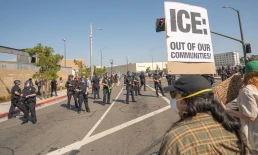By David Swanson, RootsAction
I read Daniel Sherrell’s Warmth: Coming of Age at the End of Our World sitting on the edge of what was left of the Shenandoah River after a summer of very little rain. Six inches is enough to canoe in but it’s less than that in many places. Fish are few and far between, yet humans are out there in canoes, dragging them over rocks, casting their lines, luring the last fish to their doom. I know the fish murders are not the problem, not at this scale. The problem is the power lines hanging low across the water, the 12-foot American Flag hung up on the shore, the massive actions of corrupt governments and industries — but also the cabin my family’s in and the car that drove us to it — not to mention the airplanes audible from great distances and tricking the mind into hoping for thunder.
Daniel Sherrell’s book refers only to “the Problem,” never using other words for it. We know what it is, even from the book’s title: “warmth.” The problem is in pretending that increasingly corrupt institutions will reverse themselves and try to lessen the damage of global heating, when massive fires and floods and storms and crop failures wash right over them. The problem is in the endless effort to imagine what’s happening into the future in order to pretend that in that future people will come to their senses.
Sherrell was born in 1990, when I was 20. By the time he was 20, he was well aware, and he wasn’t terribly interested in pretending. He was very interested in trying, and still is, in trying his best to change things. He was a key part of a campaign that moved the State of New York to commit to ending fossil fuel use in the future. But he didn’t imagine it was enough. He was, incidentally, up against the indifference to human death and destruction that is Governor Andrew Cuomo, now facing possible impeachment for outrageous behavior that — like everything else — just doesn’t measure up to the destruction of life on the planet, the criminal behavior of all of the Pruitts.
Sherrell refers to those most responsible for the collapse of the Earth’s climate as Pruitts, in honor of former EPA Administrator Scott Pruitt. Of course it isn’t true that Andrew Cuomo doesn’t know or didn’t know, or that he bears no responsibility, or that the State of New York doesn’t matter, or that there are too many people responsible for any of them to be responsible, but the accumulation of such thoughts is overwhelming and characteristic of the Problem.
Of course it’s also not true that there aren’t two problems. The risk of nuclear apocalypse has grown greater than ever before. It’s just not fashionable to mention it. But does fashion free us of responsibility for recognizing both of the two Problems? Within the singular problem of climate, it is my understanding that livestock is a significant contributor, although it is highly unfashionable to mention it. But does that free us to focus only on the oil, gas, and coal polluters as Sherrell does? Does it matter? If a few percent of people would focus on any aspect of any problem — as Sherrell has done — the problems would be solved. The problem is not whether every activist is aware of every avenue for activism. The problem is the greater than 99 percent who are inactive.
Much of that inactivity comes from mentally avoiding the existence of the problems. Even those focused heavily on dealing with a problem must, as Sherrell recounts, find ways not to think about it constantly, ways to act almost as if it isn’t there if only to stay sane enough to work on addressing it. Humans have had endless practice at pretending a problem isn’t there, of course — so much that we’re far too skilled at it. Ignoring individual future death is a constant daily exercise in the life of a human being, and ignoring ecocide is easily accommodated into that model.
Of course it goes beyond ignoring to pretending, pretending that death doesn’t end life or that ecosystems aren’t imploding or that people can move into outerspace or into some sort of computerized existence or into billionaires’ bunkers and survive. Sherrell opens his book with an account of the 2018 suicide of David Buckel who issued a warning about fossil fuels. Sherrell accuses himself and others of pathological adaptiveness to the problem, yet he is devastated by the ability of society to roll right along after Buckel’s suicide because it removes the possibility of Sherrell usefully killing himself for the cause. If you cannot kill yourself for the cause, and you cannot successfully advance it through living, and you cannot of course — by the very nature of the thing — pass the task along through your family any more than you can pass down a healthy ecosystem, what can you do?
I suppose you could write a great book. That’s what Sherrell has done. In it he sometimes addresses his thoughts in the second person to his imaginary child, although he’s fairly firmly decided against having children. In the absence of a longed-for family that might keep him sane, Sherrell tries therapy and meditation, though they don’t seem to work as well as working. The most effective means of staying cheerful always seems to be actually working to address the cause of the grief or outrage (even with very little success), and yet people resist admitting to the existence of the Problems because they think that will abolish cheerfulness. I even think awareness of the Problems can make you appreciate nature all the more, despite and because of the tragedy of its loss.
Here’s something you can do: http://cop26.info
Recent Posts
U.S. Media Keen on Iranian Unrest—Less So on U.S. and Israel’s Role in It
January 30, 2026
Take Action Now Democrats have a rare moment of leverage to pass legislation ending qualified immunity for Immigration and Customs Enforcement…
The Senate Must Not Fund ICE, A Zero Hour Conversation With Sonali Kolhatkar
January 30, 2026
Take Action Now “We’ve seen a really sharp change in how the public views immigration enforcement, particularly ice, to the point where…
How Democrats Can End Qualified Immunity for ICE Agents
January 28, 2026
Take Action Now Democrats have a rare moment of leverage to pass legislation ending qualified immunity for Immigration and Customs Enforcement…
Save New START- Nuclear Arms Treaties Must Not Expire
January 27, 2026
Take Action Now Letting New START expire would end more than a treaty — it would end the last remaining restraint on nuclear escalation.By Leah…




